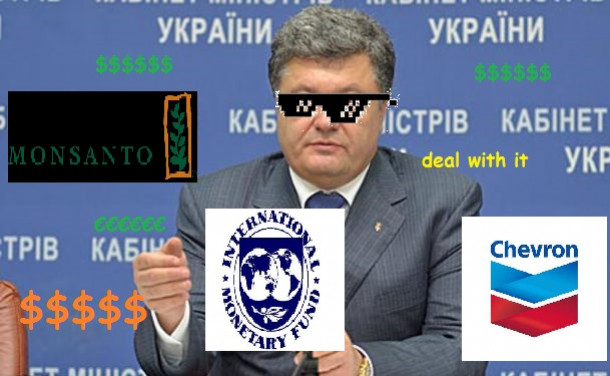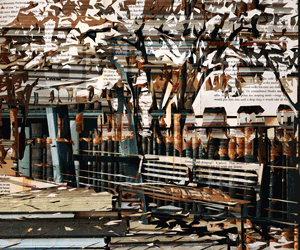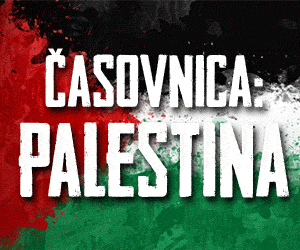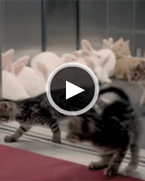»Members of congress, I have the high privilege and distinct honor of presenting to you his exellency Petro Poroshenko, president of Ukraine:
'Mr. Speaker, majority leader, members of the house, members of the senate, ladies and gentlemen. It's impossible to imagine what I am feeling right now. How simbolic is the unity of Unites States Congress and solidarity with Ukraine.'«
Kot smo že poročali, je v torek Ukrajina dobila novo vlado. Tri vplivna ministrstva, finančno, gospodarsko in zdravstveno, so zasedli tujci. Vsem trem je predsednik Petro Porošenko dodelil državljanstvo, še isti dan pa jih je parlament imenoval na mesta v vladi. Američanka Natalija Jareško, prej zaposlena na ameriškem zunanjem ministrstvu, kasneje vodja gospodarskega oddelka na ameriškem veleposlaništvu v Kievu ter dosedanja direktorica hedge sklada Horizon Capital, je zasedla finančno ministrstvo, Litovec Aivaras Abromavičius je bil zaradi svojih izkušenj pri upravljanju podobnega sklada East Capital zahodu povšečen gospodarski minister. Zdravstveni resor je prevzel Gruzijec Aleksander Kvitašvili, ki je že opravljal enako službo v Gruziji.
Imenovanje nove vlade in s tem treh tujih ministrov je le del širše slike. Gre za popolno korporativno razprodajo Ukrajine, v kateri glavne akterje, ki so internacionalne korporacije, podpira mednarodni denarni sklad IMF. Ta ima sicer že zgodovino vmešavanja v ukrajinsko politiko. Zgodovinski uvod poda John Weeks, ekonomist na inštitutu za orientalske in afriške študije:
»I don't know how many older listeners you have but anyone over about 40 will remember the absolutelly disastrous effect of structural adjustment, the shock therapy programmes in the early 1990s throughout the former Soviet republics. And Ukraine was hit the hardest. The per capita income of Ukraine in 1998, 8 years after it's independence, was over 50 % lower than it was in 1990. So the consequence of the IMF program was a major contribute to that, because it involved not only the cutting the government expenditure, but more importaint, the immidiate liberalization of prices, that is eliminating all price controls, which meant that Ukrainian industry had no time to adjust from a system of central planning to a system of mixed economy, which was capitalist oriented. There was no adjusment period. So thousands of factories closed and tens of thousands of people lost their jobs, particularly in the eastern part of Ukraine, near Russia. So to those people it seemed far from being liberation, the end of the Soviet Union proved a human disaster. The life expectancy fell, child mortality rose, it was quite a terrible and disastrous time and now it threatens to happen again.«
IMF je v Ukrajini nazadnje interveniral aprila letos, ko je v državo preusmeril 17 milijard dolarjev. Tok tega denarja in posledico toka opiše Jack Rasmus, profesor politične ekonomije na St. Marys College v Kaliforniji.
»You know package was 17.1 billion and the IMF has only dispersed 4.5 billion and most of that was for Ukraine to continue making payments to the western banks and the IMF on the previous loans. So this is typical IMF. You give the country a new loan in order to make payments on your own loan, both to you, the IMF, and to private banks. And that's the primary objective of these bailout funds from the IMF. The next part of an IMF deal is to force the government of a country to squeeze it's citizens by reducing subsidies and laying off public workers, reducing their wages, cutting their pensions and all these other moves to free up money to give tax cuts for businesses and subsidies for businesses. That's the second aprt of a typical IMF solution and that's what's going on now.«
Ena izmed standardnih zahtev Mednarodnega denarnega sklada je uvedba prosto plavajoče valute. To potezo je ukrajinska vlada uvedla že februarja, o njenih posledicah pa John Weeks:
»You have an unstable political situation, that is going to lead to an unstable economy and therefore an unstable currency. If you then float the exchange rate, which basically means that the government allows it to rise and fall as a result of buying and selling of the currency in the market. And it is a very small, compared to other countries, it is a very small market for the currency, so therefore a few speculators, one or two hedge funds or George Soros type wealthy people, a few speculators can make that currency jump up and jump down by colluding together and perhaps even colluding with the government. So that generates economic instability. It has a negative political impact, because whenever should the government attempt to take certain progressive steps, which let me say I don't think this government would, but what if there was a Ukrainian government that did want to take some progressive reform, then speculation against the currency can be used as a way of limiting the ability of the government to take those reforms.«
Takojšnji padec vrednosti ukrajinske hrivnije je vlado prisilil k razprodaji zlatih rezerv. Ukrajinske oblasti trdijo, da je bilo zlato ukradeno, prst pa uperjajo proti pobeglemu predsedniku Janukoviču. Naš sogovornik Rasmus ima za izginulo zlato drugačna pojasnila:
»I'm sure that the gold reserve is being used by the Kiev government to purchase foreign currencies. You know their own foreign currency reserves have almost fallen to zero over a month ago, they are only 12 billion. And the Central bank of course, if it runs out of currency reserves, then it can't make loans to the Ukrainian banks and businesses that need that money to make purchases from abroad. They need the currency. So if you are running out of dollars, which the Ukrainian central bank is, the only other way is to buy dollars and you can use your gold, what you have left, to buy dollars. Generally in open markets they won't sell you dollars, if your currency is callapsing, which the Ukrainian currency is, it's down over 60 %. So you gotta use dollars, or you gotta use gold. So I'm sure the gold is being spent to buy dollars and euros in order to provide that funding to Ukrainian businesses to make purchases from the west to keep the economy going, which is mostly going down anyway. I don't think it's the question of people stealing the gold, unless you recognize that the western banks and the IMF is in effect legally stealing the gold, because they have to use that gold to make purchases. Also some of the gold is undoubtedly being spent by the Ukrainian central bank to buy it's currency to keep it from collapsing as fast as it has, but that hasn't been succesful at all. So what we have is using the gold to buy up currency to prop up it's currency and using the gold to buy dollars so it's businesses can make purchases of necessary materials from the west.«
V skladu s standardnimi ukrepi Mednarodnega denarnega sklada je nova vlada že napovedala privatizacijo cestnega in železniškega omrežja ter pristanišč. A v ukrajinskem primeru je IMF nepotreben posrednik interesov kapitala, saj si je slednji zagotovil kar neposredno zastopstvo v vladi. Govorimo o novem gospodarskem ministru Aivarasu Abromavičiusu in finančni ministrici Nataliji Jašenko. Več o njeni povezavi s hedge skladi ter delovanjem le-teh, Jack Rasmus:
»Nalatie Jaresko - who is now the finance minister, just to point it, and the american there – she is the founding member and has been on the board of this private equity firm, based in the US, called Horizon Capital. And Horizon Capital, a private equity fund, shell bank, whatever, investors and all the rich institutional and individual capitalist investors put their money in these funds and then these funds go and invest and get a return in emerging markets, in places like Ukraine. Now her whole history is working for this Horizon Capital equity firm, prior to that of course she was appointed by Bill Clinton. And there's this fund, one of the three funds that this equity firm manages, is called WNISEF - Western newly independent states enterprise fund. Horizon Capital, WNISEF are part of the focus on eastern Europe. There's two other funds, that are part of Horizon Capital and they have been focusing on investments and acquisitions in Moldova and Belarus as well as the Ukraine and elsewhere in eastern Europe. So the WNISEF fund is really a cover fund , partly set up by the US government. It's board of directors were appointed by Bill Clinton, so that's the US government connection in these funds here. You know they are sort of front groups, economic front groups, you could almost call them economic NGOs, that go in and buy up and take the companies and make sure that businesses in these countries are pro-west, pro-US. So anyway, she is the chairman of this WNISEF fund and member of the board of directors of Horizon Capital. But now she is also the finance minister of Ukraine. So guess what she's gonna do? She's gonna help her fund and Horizon Capital to make investments and get rich off of Ukraine. If you look at the investments of Horizon capital they are largely agricultural related. Agricultural commodities, food distribution, food processing, agricultural equipment, but also in banking and finance and pharmaceuticals. And also to some extent there is connections with the US defence industry there – used aircraft and some other naval electronics firms, Chicago board of trade, Cargill, big US agribusiness company. So it's agribusiness and defence related – this fund. And I'm sure as the finance minister now of Ukraine, Jaresko will be making it easy for this fund and others like it to buy up the agricultural businesses in the Ukraine and take them over. The other appointee, Abramovichius is a Lithuanian, but who has connections with western europe and german investment banks. He's the economics minister. So you know, here come the vultures. They are coming in under the guise of restructuring of Ukrainian economy, they are going to help western capitalist buy up the best available investments in the Ukraine.«
Kot omenja Rasmus, so investicije Horizon Capitala poleg orožarstva skoncentrirane na kmetijsko industrijo. Prav kmetijstvo je eden najzanimivejših sektorjev v Ukrajini. Država se ponaša s 30 odstotki najrodovitnejše prsti na svetu, tako imenovanega černozjoma. V zadnjih letih je bilo tujcem razprodane že čez milijon hektarov zemlje, večino investicij pa prihaja iz držav, ki sicer nimajo velikih kmetijskih površin, imajo pa zato velik finančni sektor: Luksemburga in Cipra. Monsanto, agrikulturno in agrokemično podjetje, načrtuje 150 milijonov dolarjev vredno investicijo v proizvodnjo zaenkrat genetsko nespremenjenih semen. V nekaj letih napovedujejo podvojitev svojih vložkov v državo, s tem pa morda tudi uvedbo genetsko spremenjenih rastlin na evropska tla. Ta so zaenkrat v Ukrajini še prepovedana, kar pa se z novo sestavo vlade utegne kaj hitro spremeniti.
Prav tako ameriška kmetijska multinacionalka Cargill je januarja za 200 milijonov dolarjev kupila 5-odstotni delež ukrajinskega podjetja UkrLandFarming. To podjetje, ki ima sedež na Cipru, kotira pa na londonski borzi, je osmo največje kmetijsko podjetje na svetu, njegov ustanovitelj pa je Oleg Bakhmatyuk, 38-letni ukrajinski oligarh z interesi na zahodu. O vplivu investicij kmetijskih multinacionalk na ukrajinsko gospodarstvo in prebivalstvo John Weeks:
»These agrobusinesses, what they have in mind is to produce for export. Because per capita income is very depressed in Ukraine, the market is going to be correspondingly limited. So what I think those companies have in mind is primarily exporting to European Union and then the Ukrainians will be importing cheap European food, which will undercut smallholder production. To put it simply: large production in the Ukraine will develop for export, the small producers, which are producing grain and other things, which are consumed by local population, will be driven out of business by imports from Europe. That is a pattern, which has occured again and again in Moldova and in other countries in the European Union and I think that's what will happen in Ukraine.«
Velike multinacionalke bi lahko Ukrajino preimenovale kar v deželo sladkorčkov. Interesnih področij namreč kar ne zmanjka. Ukrajina je s 1200 milijardami kubičnih metrov zemeljskega plina v skrilavcu tretja država v Evropi po zalogah tega energenta. Največji nahajališči plina sta na skrajnem zahodu države v bližini mesta Lviv in na skrajnem vzhodu države v bližini etnično pretežno ruskega mesta Doneck. Za izkopavanje se že zanimata podjetji Shell in Chevron. Izkopavanje in raziskave naj bi se začela prihodnje leto, do komercialne uporabe plina pa naj bi čakali do leta 2017. O motivih za nenadno zanimanje in voljo do frackinga Jack Rasmus:
»Well you know they are going to obviously at least explore for shale gas and if they can find a way of making Ukraine independent of Russian gas. That's what it's all about. You know all this crisis in the Ukraine, precipitated by the US and driving along it's western European countries, the big picture is really about preventing the western Europe, particularly Germany, and eastern Europe from growing dependance on Russian gas. That's what it's about. The US wants to break that relationship before it gets too deep and I believe they are using this Ukraine crisis, trying to provoke Putin, as a way of driving a wedge between western Europe and Russia and severing those economic relationships. I think that's the big picture behind all this and why the US stepped in and provoked this coup, which it clearly did last February, and that explains a lot of what's going on there I think. In the meantime of course they are making money off of Ukraine, as they have off these other eastern European countries in the process.«
Kot zanimivost dodajmo, da sin ameriškega podpredsednika Joa Bidena, Hunter Biden, sedi v nadzornem svetu podjetja Burisma, največjega energetskega podjetja v Ukrajini. Sorodstvene vezi pa v ukrajinski zgodbi ponujajo tudi uvid v geopolitiko konflikta, o kateri je govoril Rasmus. Mož podsekretarke za evropske zadeve na ameriškem zunanjem ministrstvu Viktorije Nuland je Robert Kagan, soustanovitelj projekta za novo ameriško stoletje. Ta neokonservativni možganski trust je bil vodilo Busheve zunanje politike. Njihova agenda, kot je znano, stremi k popolni ameriški korporativni prevladi nad svetom, za dosego tega cilja pa po potrebi svetujejo tudi uporabo vojaške sile. V ta plan sodi tudi osvoboditev Evrope iz ruskega primeža in vstop ameriških multinacionalk na evropski energetski trg ter dostop do ukrajinskega kmetijstva in industrije.
Rodovitno ukrajinsko zemljo sta skultivirala Zwitter in vajenec Žan.






















Prikaži Komentarje
Komentarji
Tole obvezno pod uredniški izbor!
Zelo informativen prispevek.
Ima kdo mnenje, kako naj se Ukrajinci rešijo, ko so med Scilo in Karibdo?
Komentiraj